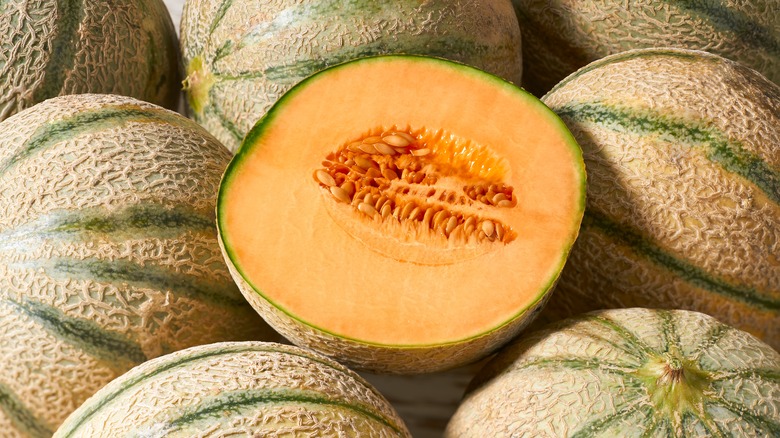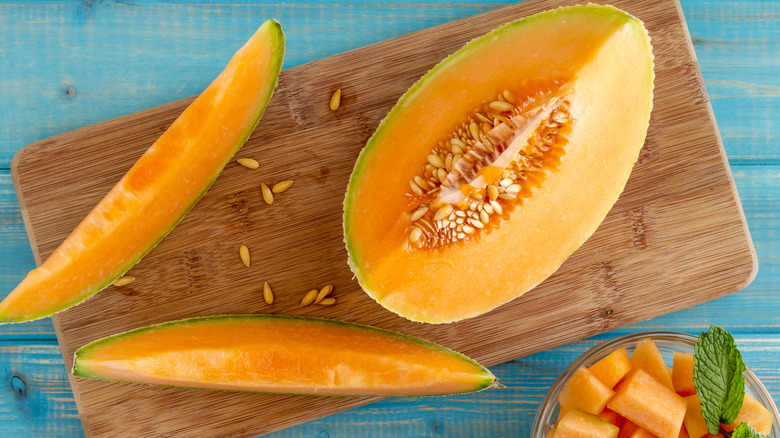Why You Should Stop Throwing Out Cantaloupe Seeds
We all know the fleshy fruit that's sweetest in the summer — cantaloupe. Whether you cut it into wedges and wrap it in prosciutto or dice it for a tangy fruit salad, odds are you scooped the seeds out along the way and tossed them right in the trash. It's always assumed that's the right thing to do, but we are never told why. Sure those stubborn, stringy bits are messy to deal with, so it's easier to get rid of them. But what if we told you those scraggly innards have major health benefits? Would you try them?
According to Livestrong, melon seeds are saved, toasted, and eaten as a snack or salad topper in the Middle East and China. If that sounds familiar, that's because it's common in the United States to do this with pumpkin seeds. Before you go toasting and eating every seed out there, it's important to do your research to ensure each one is safe to consume, and what they do for the body.
Cantaloupe seeds are exceptionally good for you
Turns out, cantaloupe and the seeds are pretty amazing for you, and have a longer shelf life than most people think. Kidadl states that the seeds are not only packed with a significant amount of vitamins such as vitamin K, vitamin A, vitamin E, vitamin C, zinc, magnesium, potassium, selenium, and fiber, but they also act as an added source of protein for those on a plant-based diet. Studies show that cantaloupe seeds rival soy milk in terms of protein content (via Livestrong). In fact, according to Cook'n, 100 grams of cantaloupe seeds contain 21 grams of protein — to compare, a 4-ounce hamburger patty contains 28 grams of protein.
Some creative ways to incorporate these superfood seeds into meals are by blending them into soups and stews as an emulsifying agent, sneaking them into crumbles or streusel toppings for pies, muffins, and cobblers, tossing them in oil and seasonings, and roasting until crispy, or even adding to sandwiches for that extra crunch.
Consuming too many can come with risks
As excellent as cantaloupe seeds are for you, eating too much cantaloupe can yield some negative side effects. Kidadl states that 7.86 grams of sugar are in every 100 grams of this melon, which can raise blood sugar levels when consumed on a large scale. The fruit has a high water content with a ton of fiber. When eating beyond the serving size, that excess fiber can cause stomach pain and diarrhea due to a disrupted gastrointestinal tract. While none of these side effects are detrimental to your health, it's smart to stay within the recommended serving size, which is one cup or around 160 grams, to prevent any uncomfortable symptoms.
Lastly, cantaloupe seeds contain several nutrients known to strengthen hair and skin, which is why companies are creating cantaloupe seed extract. News Directions Aromatics states that as a source of over 10 different vitamins and minerals, using the extract as a topical solution may provide many positive benefits, such as skin surface renewal from the retinol in vitamin A, reduced appearance of scarring due to the pyridoxine in vitamin B6, and moisture retention in hair and skin due to the omega 6s in linoleic acid.
So, next time you're prepping a cantaloupe for snacking, remember to save the seeds because they are just as good to your taste buds as they are for your body.


